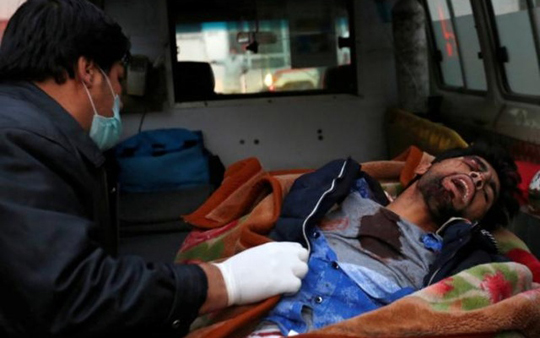Kabul, Jan 11: A Taliban suicide attack in the Afghan capital Kabul on Tuesday killed more than 30 people and wounded some 70 others, as twin blasts hit a crowded area of the city during the afternoon rush hour.

Saleem Rasouli, a senior public health official, said 33 people had been killed and more than 70 wounded on the Darul Aman road, near an annexe to the new Indian-financed parliament building. Most of the victims were parliamentary staff members.
The Islamist militant Afghan Taliban movement, which immediately claimed responsibility for the attack, said its target had been a minibus carrying staff from the National Directorate of Security (NDS), Afghanistan's main intelligence agency. It put casualties at around 70.
It said one suicide bomber attacked the minibus in the Darul Aman area, and was followed almost immediately by a car bomber, who killed security forces attending the scene.
"Right after the explosion, I jumped in a stream and then I saw some injured people and a bus which was totally burnt out," said Sajadullah Khan, a witness who was walking by when the blasts occurred.
President Ashraf Ghani condemned the "criminal" attacks and vowed that the perpetrators would not be safe anywhere in the country.
"The Taliban shamelessly claim credit for the attack on civilians and they're proud of it," he said in a statement.
The attack underlined the security threat posed by Islamist militants fighting to topple the Afghan government and drive out foreign troops stationed there for the last 15 years.
Afghan armed forces control no more than two thirds of national territory, and have struggled to contain the Taliban insurgency since the bulk of NATO soldiers withdrew at the end of 2014.
Several thousand, mainly Americans, remain in training and counter-terrorism roles.
The United States recently announced plans to send 300 Marines to the volatile southern province of Helmand, large parts of which are under Taliban control, as part of a regular rotation of troops helping train and advise Afghan forces.
Earlier on Tuesday, a suicide bomber killed seven people and wounded nine when he detonated his explosives in a house in Helmand used by an NDS unit.
Thousands of civilians have been killed in Afghanistan in the 15 years since the Taliban government was brought down in the US-led campaign of 2001.
In July, the UN Assistance Mission in Afghanistan reported that 1,601 civilians had been killed in the first half of the year, a record since it began collating figures in 2009.
As well as the Taliban and associated groups including the Haqqani network, militants pledging loyalty to Islamic State have carried out major attacks in Kabul, most recently in November when more than 30 people were killed by a suicide bomber in a Shi'ite mosque.






Comments
Add new comment